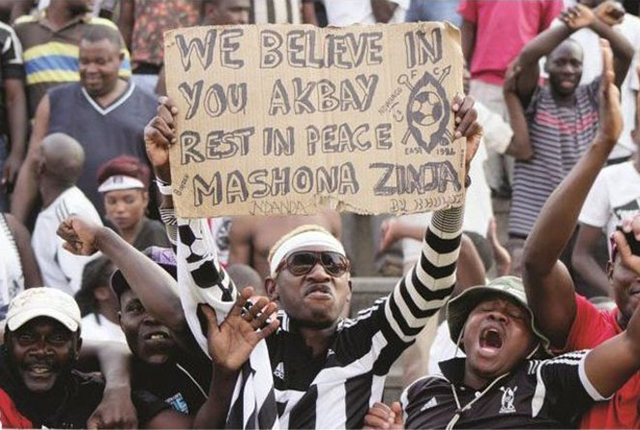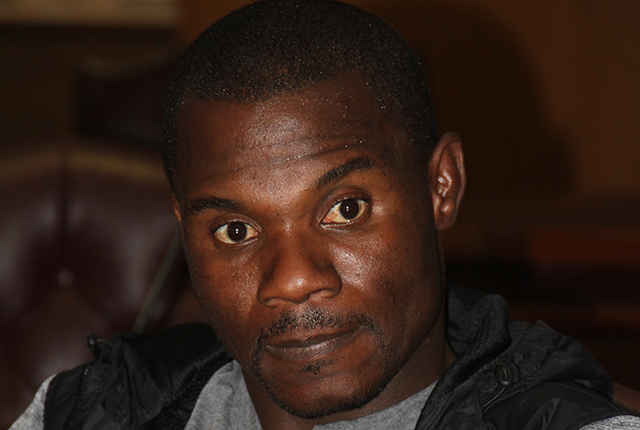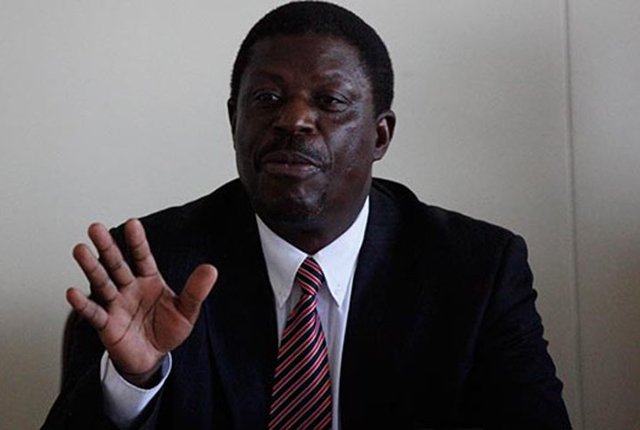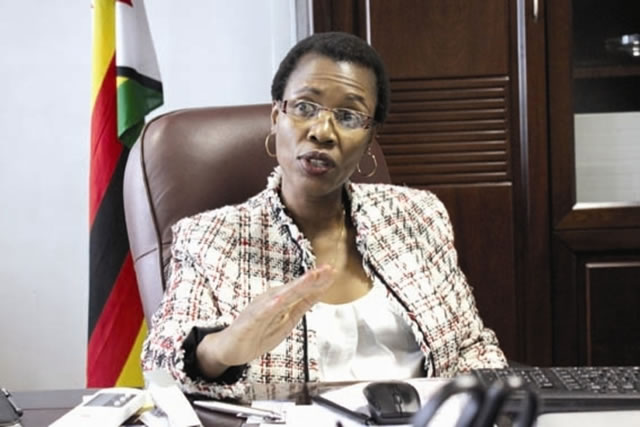Tribalism and small minded men


This Highlanders Football Club supporter caused an outcry and a tribal storm when he held up a handwritten banner in which he called the Shona “izinja” (dogs) at Barbourfields a few weeks ago
My Turn with Tichaona Zindoga
This is Year of Our Lord 2016, and a couple of months before the year is out, actually. It is Zimbabwe’s 36th year of Independence from colonial rule, again gravitating towards another year.One would think some conversations were so yesterday and no longer necessary or acceptable in a polity like ours — even if relatively young — what with all our vaunted education.Tribalism, whether by way of praxis or by way of framing and understanding of issues, is really shameful a phenomenon.
But Zimbabwe, it would appear, has not overgrown it yet.There are two recent specimens.A few weeks ago, a Highlanders Football Club supporter caused an outcry when he held up a handwritten banner in which he appeared to suggest that Shona people were “izinja” (dogs).
Highlanders were playing Dynamos in Bulawayo and the presumption was that supporters of Dynamos — and players too — were all Shona whereas the fan identified himself and his colleagues as Ndebele.
In general, as constructs Shona and Ndebele are used to describe language and ethnic identities: the one spoken and identifying mainly people in the east and north of Zimbabwe and the other in the south west.
But the generalisations are difficult from the onset as they are broad and often make wrong assumptions about the identity of people who, in the case of the Ndebele for example, are not even “original” Ndebele, but were either assimilated or associated with those who were of the Nguni stock that left South Africa in the mid-1800s.
The so-called Shona people are also as varied from the Zeruru to Manyika and a host of other subgroups in between.But that’s a really boring subject that we could leave for the likes of Pathisa Nyathi or an Aeneas Chigwedere.The main point being, Zimbabweans are better off without concentrating on other useful things than obsessing with petty tribalism debates.
It is much worse when one imagines that some of those that seek to peddle issues such as tribe may actually not belong to where they think they belong.Accidents of history and biology may actually have made them, or one forebear in the line, out of the bloodline.Issues of paternity are really tricky and it is thus perennial wisdom that it is only the mother that knows the real paternity of her children.
Intermarriages are also commonplace meaning that there are zero chances that any one tribe can be considered “pure”.So, that placard-waving Bosso supporter could as well have not been Ndebele, as he fancied!
It gets twisted, doesn’t it?It will be critical to note that both Dynamos and Highlanders have supporters and players from different tribes in Zimbabwe, which is the reason why such petty tribal issues should not be allowed anywhere near our soccer or any other decent place or endeavour.
That Bosso fan should be hanging his head in shame.But then given the animated discussions on social media that followed, with strong polarising views being exchanged, he might as well be suffering from something incurable he and others suffer from.
Tribalism is considered to be an African disease and this has often had very deadly consequences especially in politics.These past few days in Zimbabwe, the issue of tribalism has been raised once again and a lot of dust has been swirling so disturbingly in political circles.As is now common knowledge, Higher and Tertiary Education, Science and Technology Development Minister Professor Jonathan Moyo has been fingered in the misappropriation of money from the Zimbabwe Manpower Development Fund.
When the constitutional body of the Zimbabwe Anti-Corruption Commission expressed interest in interviewing him, Prof Moyo raised the issue of tribe and how he had become a target of both tribal and factional plots.The debate is raging ever so strongly right now and Vice President Phelekezela Mphoko has also been sucked in.
People are exchanging harsh words on social media and other spaces.Some feel that the tribal card is being played to divert attention from a potentially criminal act of graft by Prof Moyo and his subordinates at the ministry.
Others, perhaps for the first time, are springing to the defence of Prof Moyo because they feel that the tribal conspiracy is real and one directed against someone (supposedly) from a marginalised tribe.
The debate is heated.One newspaper has claimed that the ruling Zanu-PF is “imploding” because of the corruption allegations, and chiefly the tribal-factional undercurrents.You wouldn’t believe this is Year of Our Lord 2016.No, you can’t believe how small minded some people can become when a real and existential issue like corruption is mired in a subject such as tribalism.
And a point has to be made that if a real and existential issue like corruption, which is probably the country’s number one enemy, is identified and needs to be tackled, there is absolutely no reason why it must not be investigated and punished regardless of the person’s background and present station.
A corrupt official from Tsholotsho is as bad as one from Murehwa, for they bleed our nation, steal futures and family silver.
It is that simple.
Equally, a thief and corrupt official from anywhere under the Zimbabwean sun should not cry, literally or otherwise, when the long arm of the law gropes about to catch up.
The long arm of the law is the comeuppance of evil ways.Tribe has little to do with it and the intelligence of an educated nation like Zimbabwe should not be gratuitously insulted.In the final analysis, it shall be argued that tribalism is a real cancer that has caused wars and stalled development and democracy in Africa.
Professor Calestous Juma notes that, “The challenge to democracy in Africa is not the prevalence of ethnic diversity, but the use of identity politics to promote narrow tribal interests. It is tribalism.”
He reveals that, “Leaders often exploit tribal loyalty to advance personal gain, parochial interests, patronage, and cronyism. But tribes are not built on democratic ideas, but thrive on zero-sum competition.“As a result, they are inimical to democratic advancement.”











Comments